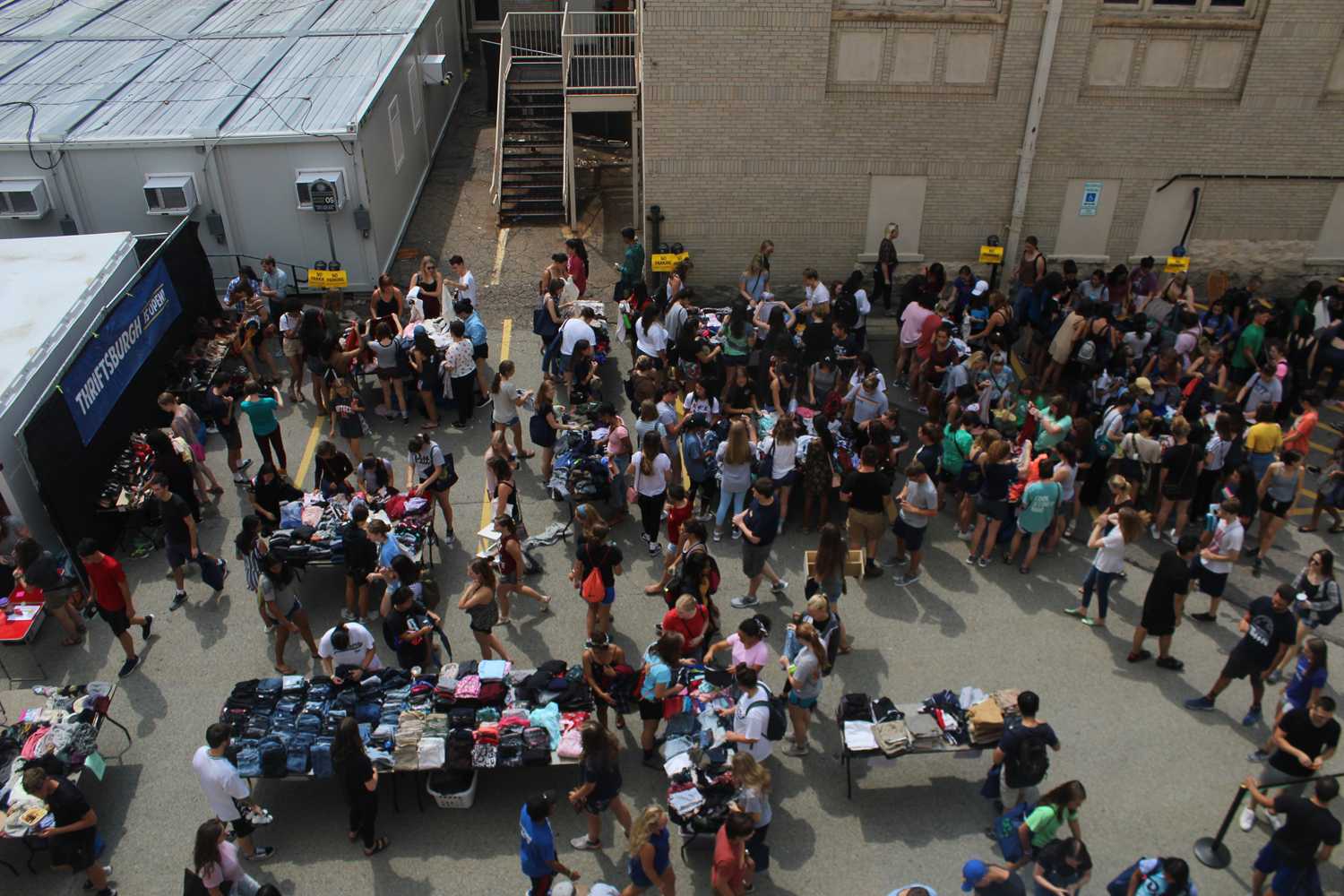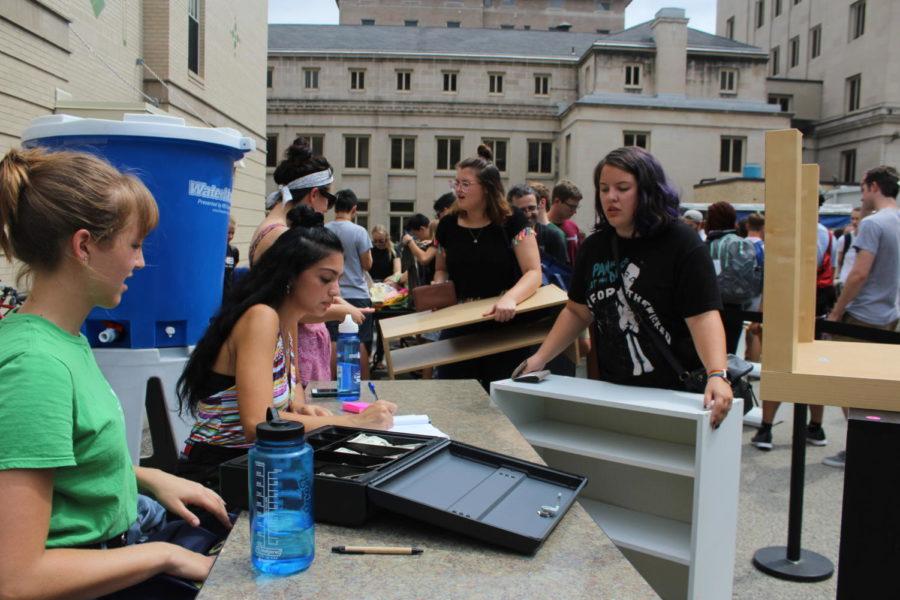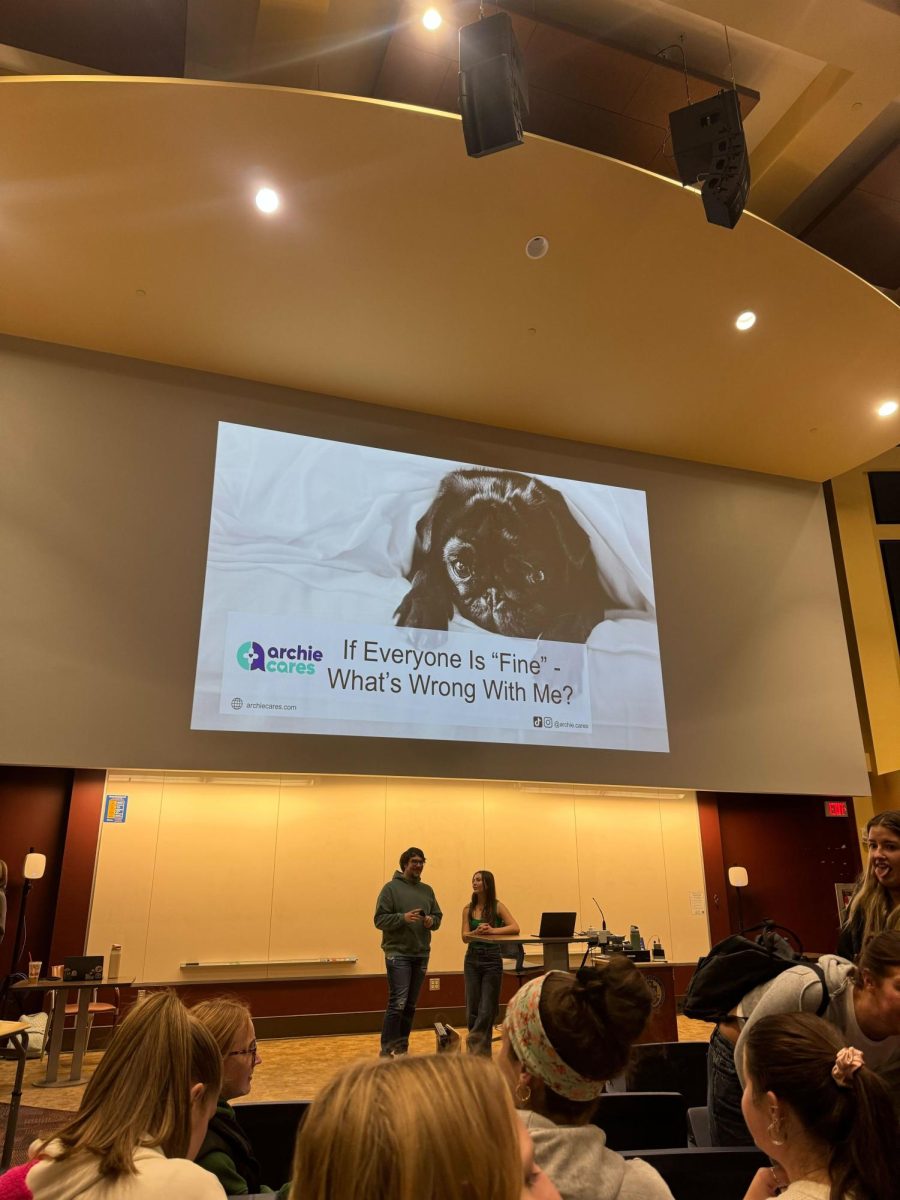Thriftsburgh returns to save students money
Thriftsburgh made more than $5,500 in profit at Sunday’s rummage sale, selling primarily household items and clothing. (Photo by Sarah Cutshall | Staff Photographer)
August 28, 2018
Plastic cowboy boots covered in paisley prints. Pumpkin-colored skinny pants. Designer brand “Scotch and Soda” T-shirts sold for the same price as Champion-brand shirts. The University of Thriftsburgh — Pitt’s student-run thrift store — is back in business in O’Hara 111, and despite being one of the cheapest games in town, it’s already turning a profit.
Thriftsburgh, which sells tees for $3, jeans for $5 and winter coats for $10 regardless of the clothing brand, branched into household appliances for its third annual Rummage Sale on Sunday afternoon in the O’Hara parking lot. Hundreds of students lined up around the block to buy secondhand microwaves, silverware and plastic drawers, netting the group more than $5,500 in profits.
“It was the the biggest sale we’ve done so far,” Thriftsburgh president and senior human resources major Forest Goebel said.
Thriftsburgh was founded by graduates Anna Greenberg and Paul Heffernan in 2015. The group has since grown to a board of three members, which consists of Goebel, urban studies major Breanna Decaro and junior environmental studies and communication major Kevin Pealer. It also recruits volunteers around campus for major events.
Board members and volunteers with Thriftsburgh collected the appliances for the 2018 Rummage Sale as donations from students moving out of Oakland at the end of the last school year, with the help of Pitt Sustainability group’s “Clutter for a Cause.” The program’s previous two years, while successful, didn’t match this year’s profits.
The group made just over $3,500 at their 2017 Rummage Sale. Although Goebel doesn’t have financial information for 2016, he said that the group sold at least five times as much merchandise as its first Rummage Sale. He attributed Thriftsburgh’s profits to increased online exposure, the group’s increased storage space and its growth of inventory.
“We went from three racks in 2015 to all of this now,” Goebel said.

It made slightly more than $13,000 in profits for the 2017-18 school year, which is the only year so far that Thriftsburgh has recorded financial information. Most of its money is spent paying its student workers $10 per hour to run the store and funding sustainable initiatives around Pittsburgh, such as the $6,000 it gives each year to the Pitt Green Fund — a sustainability office project that funds student environmental initiatives and gave Thriftsburgh its seed funding.
The organization encourages its shoppers to donate their unneeded items as well.
“It makes me more inclined to give my stuff away,” Claire Jefferson, a senior communication and sociology double major from Beaver Creek, Ohio, said. “I know the people here, and I don’t know them at Goodwill.”
Jefferson, a self-described thrifting fan, also appreciates the group’s continuity as it enters its fourth year on campus. As a resident assistant, she took the first-years on her floor to the same Rummage Sale she’s attended before.
“I’ve always loved thrift shopping,” Jefferson said. “I got to see my first-year students go [to the Rummage Sale] and be as excited as I was as a freshman.”
The profits Thriftsburgh makes from donations go back to the community. Goebel wants the club to support environmental and economic sustainability initiatives around campus.
“Universities function a lot like countries do,” Goebel said. “You put a lot of money where money’s made, into things like sports, etcetera … we want to help fill the gaps.”
The gaps, Goebel believes, include student food security and textbook costs. The group partnered with the Pitt Food Pantry last year to give monthly $10 gift cards to anyone who shops at the Pantry. Winter coats cost $10 at Thriftsburgh and are the most expensive items the club sells.
“We tried to scale it to our most expensive thing we sell,” Goebel said. “The idea is that you could use the gift card to buy a winter coat here, or a pair of shoes.”
Thriftsburgh’s other biggest events are its Halloween sale and its spring Birthday sale. It made just less than $1,000 during the 2017 Birthday sale, while simultaneously clearing most of its inventory before summer. And while its Halloween sales don’t match its Rummage or Birthday ones, Goebel says the compensation is ethical.
“Halloween is a holiday of consumerism, where a lot of people buy low-quality clothing and throw it out the next day,” Goebel said. “At least with us, they’re giving something a second life.”
He remembers someone bought a secondhand pantsuit in last year to go as Hillary Clinton. He used Thriftsburgh garments himself to go as a high school gym teacher.
Becky Hammond, a junior shopper on exchange from the University of Sussex in England, appreciated the store’s accessible pricing.
“I’m a student, I can’t really afford much,” she said. “This is a nice, inclusive part of [Pitt].”



